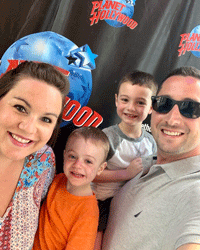Isaac Hess, now almost 2, began to develop the mysterious rash before he was even a week old. It started on his face and upper body, then progressed to his legs and back. When he was 2 weeks old, he saw a pediatrician in Erie, Pennsylvania, where he lives with his family.

“The concern was that it was neonatal lupus—that’s what the rash looked like,” says his mom, Sandy Hess.
But Isaac’s blood tested negative for lupus antibodies. Doctors next suspected that Isaac had a certain benign skin condition that usually resolves on its own. But not only did Isaac’s rash not resolve, he began to develop a new symptom.
“His face and upper body got very thin,” says Ms. Hess. “As time went on, his stomach began to look like he had a 12-pack. You could see all the muscles.”
That’s known as lipodystrophy, when the body is unable to produce and maintain healthy fat tissue.
Isaac’s dermatologist referred him to UPMC Children’s Hospital of Pittsburgh, where he saw more specialists: an immunologist, a geneticist, a rheumatologist, and still he grew sicker, developing a fever that lasted over a week. As potential causes of his symptoms were ruled out, Isaac’s health care team began to suspect that he had an autoinflammatory disease — a condition in which the inflammatory response was overactive, which could explain both the rash and the fever.
A Tentative Diagnosis
Autoinflammatory diseases and autoimmune diseases both involve the immune system. But autoinflammatory diseases involve a part of it known as the innate immune system, the “rapid responders” that fight against attacks on organs like the skin. They are extremely rare, and are thought to often be caused by a genetic mutation.
Because of that, it’s sometimes possible to find the mutation in the patient’s genetic profile, and more or less confirm the diagnosis. But that doesn’t always happen — as was the case for Isaac.
According to Isaac’s doctor, a UPMC Children’s Hospital pediatric rheumatologist, Isaac’s condition most resembles an exceptionally rare autoinflammatory disease called CANDLE (Chronic Atypical Neutrophilic Dermatosis with Lipodystrophy and Elevated Temperature) syndrome. It’s hard to know exactly how rare CANDLE syndrome is: there have been fewer than 100 cases reported worldwide.
But Isaac’s symptoms weren’t a perfect fit for CANDLE. Many children with CANDLE have fevers almost daily, and Isaac does not. Also, perhaps more intriguingly, he does not have genetic mutations typically associated with CANDLE syndrome.
The Treatment
But the important thing is how Isaac is feeling, and thanks to UPMC Children's, he’s feeling much better. CANDLE is associated with overproduction a group of proteins called Interferons. Since the beginning of April, Isaac has been taking a drug called Baracitinib that helps to block Interferon activity. Before coming to UPMC Children’s, Isaac's doctor trained at the National Institutes of Health (NIH), and worked with the team conducting a small clinical trial using Baricitnib in diseases like CANDLE. His doctor estimates that Isaac might be one of 20 children on Baricitnib in the world.
Getting Isaac on Baracitinib wasn’t easy — Ms. Hess says that the insurers refused to cover about five times. But his doctor was persistent. He sent literature, spoke to pharmacists, and engaged in peer-to-peer consultations, and finally convinced insurers to cover it. Today, Baracitinib seems to be working well for Isaac.
"The rash started to disappear within a couple of weeks,” says Ms. Hess. “He’s happy, playful and talks more. I remember when he was on the steroid prednisone, I would go into his room in the morning, and he was weepy and wanted to be held, but now he’s jumping up and down in his crib, happy.”
She is also slowly seeing improvement with his lipodystrophy, and says that he looks much better. In addition, Isaac seems to have more energy for playing with his older brother Eli, 5. “Anything to keep up with his brother — scooters, bikes — that’s what Isaac wants to do,” says Ms. Hess.
“Our doctor has done so much for us in the six or seven months we’ve been seeing him,” she continues. “I think if we’d gone to a different doctor who didn’t know the things he knows, Isaac would still be very sick. I honestly can’t say enough about how good and how smooth everything has been.”
The Pittsburgh Immunogenetics Discovery Center (PIDC)
Isaac is cared for through a new center within the Center for Rare Disease Therapy at UPMC Children’s called PIDC — the Pittsburgh Immunogenetics Discovery Center.
“The PIDC is designed for patients like Isaac,” says Isaac's doctor, “where you need to draw upon specialists in rheumatology, immunology, genetics, dermatology — all with some level of immunological expertise — working together to care for these patients.”
Isaac's doctor adds that PIDC straddles the divide between research and patient care, and cites Isaac as a perfect example of how this can work. He enrolled Isaac in a research protocol to check for Interferon activity in the blood, and it was elevated — which both was consistent with a diagnosis of CANDLE, and perhaps more importantly, suggested that Baricitnib could be a good treatment.
“I ascribe to the idea that for many patients with ultra-rare diseases, being part of research is also part of optimal care,” says his doctor.
Baracitinib is working for Isaac. At the same time, UPMC Children's continues to revisit Isaac’s genetic profile in the hope of confirming a diagnosis and perhaps finding an even better treatment that’s better tailored to Isaac’s needs.
“The value of something like PIDC is not necessarily about making the diagnoses that are easy to make genetically, but to continue to dig in with the patients where the diagnosis isn’t so obvious,” he says.
Contact Us
For more information, contact the Center for Rare Disease Therapy at UPMC Children's Hospital of Pittsburgh.









